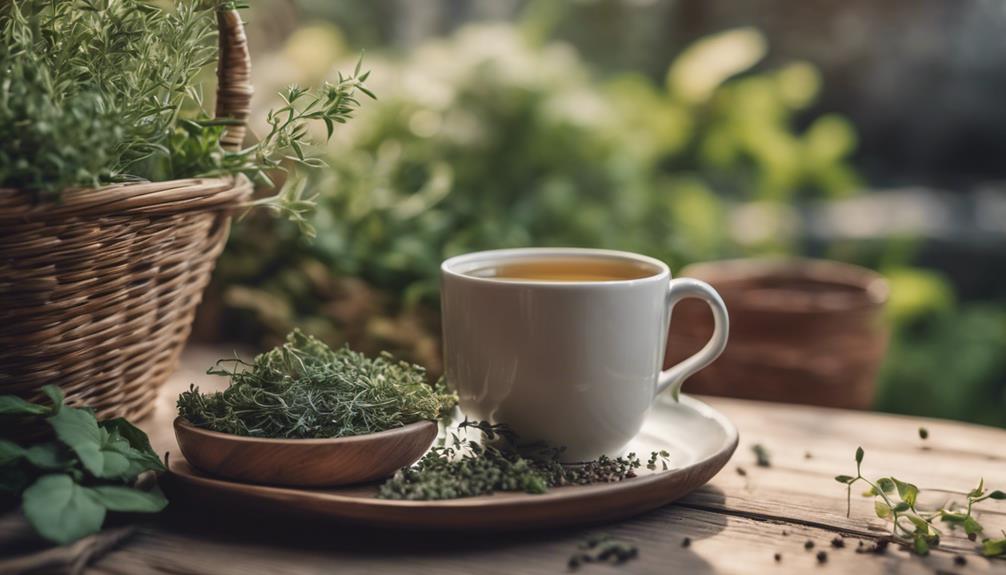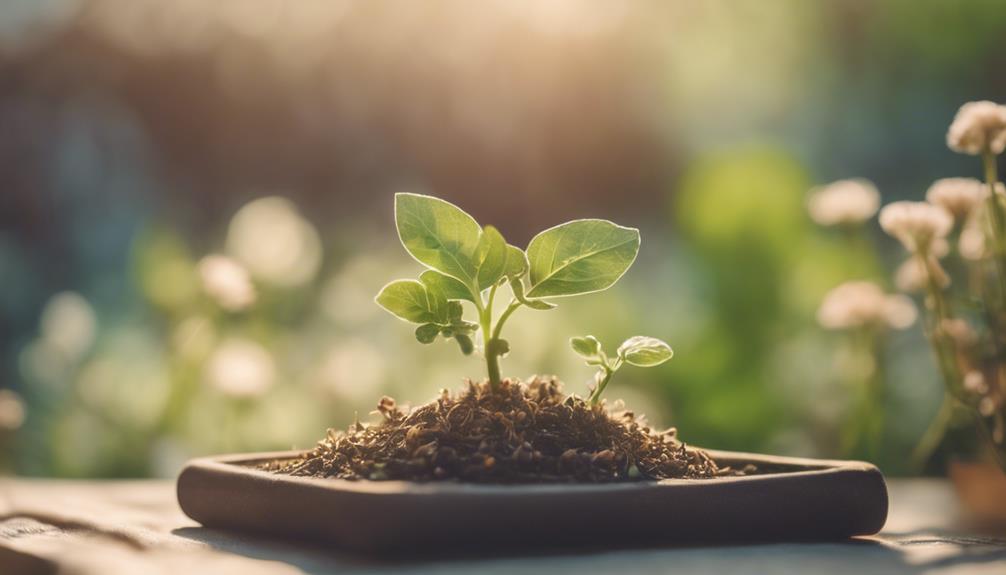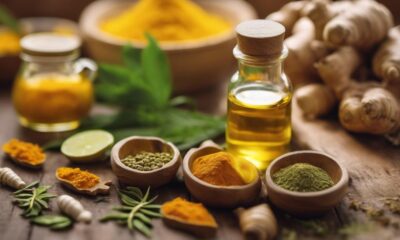Energy Vitality
5 Energizing Herbs Give You Energy as a Woman
Awaken your natural energy with Ashwagandha, Maca Root, Rhodiola Rosea, Ginseng, and Schisandra Berries – the key to vibrant vitality and well-being.

Energizing herbs like Ashwagandha, Maca Root, Rhodiola Rosea, Ginseng, and Schisandra Berries provide a natural energy boost for women. Ashwagandha boosts vitality and reduces stress hormone levels. Maca Root enhances endurance and supports libido. Rhodiola Rosea offers sustained energy, improved focus, and better sleep. Ginseng boosts natural energy, mental clarity, and physical stamina. Schisandra Berries enhance endurance, fight free radicals, and relieve stress for overall well-being. These herbs can invigorate daily life, offering a holistic approach to energy and well-being for women seeking a natural energy source.
Key Takeaways
- Ashwagandha boosts vitality and reduces stress.
- Maca root enhances energy, libido, and stamina.
- Rhodiola Rosea provides sustained energy and improves focus.
- Ginseng boosts energy, mental clarity, and immune function.
- Schisandra berries increase endurance, fight free radicals, and alleviate stress.
Top Energizing Herb: Ashwagandha
Ashwagandha, an essential herb in Indian Ayurvedic medicine, is renowned for its ability to boost energy and vitality in women. This powerful herb works at a cellular level, improving the health of mitochondria and adrenal glands. By doing so, Ashwagandha helps reduce cortisol levels linked to stress, promoting a sense of well-being and overall vitality.
Women often face various challenges in balancing work, family, and personal life, leading to fatigue and stress. Ashwagandha's adaptogenic properties make it particularly beneficial for women's health, enhancing mood, energy levels, and mental clarity.
Regular consumption of Ashwagandha can greatly help combat fatigue and stress, allowing women to navigate their daily responsibilities more effectively. By supporting hormonal balance and reproductive health, this herb plays an important role in promoting overall well-being in women.
With its ability to boost energy and vitality while reducing the impact of stress, Ashwagandha stands out as a valuable ally in supporting women's health and addressing common challenges faced by many.
Boost Energy With Maca Root

To boost energy levels and enhance overall vitality, incorporating Maca root into our daily routine can be highly beneficial. Maca root, originating from Peru, is well-known for its ability to boost energy, endurance, and libido. Rich in essential vitamins and minerals, this potent herb not only aids in managing stress, anxiety, and depression but also plays an important role in balancing hormones and improving reproductive health in women.
Here are four key benefits of incorporating Maca root into our daily regimen:
- Boosts energy levels naturally
- Enhances endurance and stamina
- Supports a healthy libido
- Provides essential vitamins and minerals for overall vitality
Whether consumed in the form of powder, capsules, or added to smoothies, Maca root is a popular choice for those seeking a natural way to improve energy levels and overall well-being.
Rhodiola Rosea for Vitality

Enhance your energy with Rhodiola Rosea, a powerful adaptogenic herb known for boosting stamina and vitality. This herb provides sustained energy levels, supporting both physical and mental performance throughout the day. Rhodiola Rosea is particularly beneficial for enhancing focus, mood, and sleep quality, contributing to overall vitality and well-being. Women can experience improvements in cognitive function when incorporating this herb into their daily routine. The recommended dosage of Rhodiola Rosea typically ranges from 100-200 mg in capsule or tablet form each day.
Rhodiola Rosea stands out as a popular choice among herbs for its ability to increase energy, stamina, and overall performance. Its adaptogenic properties make it a valuable addition to a woman's wellness regimen, offering a natural way to support cognitive function and enhance well-being.
Ginseng: Natural Energy Enhancer

With its long history in traditional medicine, ginseng emerges as a powerful natural energy enhancer for women seeking sustained vitality. Ginseng, a popular herb used for centuries, offers various benefits for women's well-being:
- Boosts Natural Energy: Ginseng contains active compounds like ginsenosides that work to enhance energy levels and combat fatigue.
- Adaptogenic Properties: Known for its adaptogenic properties, ginseng helps the body adapt to stress, promoting overall energy and resilience.
- Supports Mental Clarity: Regular consumption of ginseng can aid in improving mental clarity, enhancing focus and cognitive function.
- Enhances Physical Stamina and Immune Function: Ginseng is recognized for boosting physical stamina and supporting immune function, contributing to overall vitality.
Women looking to maintain sustained energy levels and vitality can benefit from incorporating ginseng into their daily routine. This natural energy enhancer offers a holistic approach to enhancing both physical and mental well-being.
Revitalize With Schisandra Berries

Revitalizing with Schisandra berries offers a vital way to boost energy and overall well-being. These berries are renowned for enhancing physical endurance and cognitive function, making them a valuable addition to one's daily routine. Packed with antioxidants, Schisandra berries play an essential role in strengthening the immune system and fighting off free radicals. Additionally, the consumption of Schisandra berries can aid in stress relief and alleviate symptoms of depression, promoting mental well-being.
To showcase the benefits of Schisandra berries, let's explore a table highlighting their key advantages:
| Benefits | Description |
|---|---|
| Antioxidants | Boost the immune system and fight off free radicals. |
| Stress Relief | Help in reducing stress levels and promoting relaxation. |
| Cognitive Function | Enhance cognitive abilities and support mental clarity. |
Incorporating Schisandra berries into your diet, whether through teas, supplements, or tinctures, can provide a natural energy boost and contribute to your overall well-being.
Frequently Asked Questions
What Herbs Give You Energy for a Woman?
We can boost our energy levels with adaptogenic herbs like Ashwagandha and Rhodiola Rosea, increase stamina with Maca root, combat fatigue with Dandelion root and Eleuthero, and improve cognitive function with Schisandra berries and Ginseng varieties.
What Herbs Give the Most Energy?
We've researched extensively on energizing herbs to find the most potent ones. Ashwagandha, Maca, Rhodiola Rosea, Dandelion root, and Eleuthero are top contenders. These herbs provide sustained energy, mental clarity, and overall vitality, making them excellent choices for boosting energy levels.
Which Herb May Improve Memory and Boost Energy?
Improving memory and boosting energy, Bacopa is a herb that supports cognitive function and provides an energy kick. Studies confirm its benefits in enhancing focus and overall brain health. Incorporating Bacopa may combat fatigue and promote sustained energy levels.
What Spice Gives You Energy?
Turmeric, the golden spice, doesn't just add flavor, but it's like a life force bomb! This powerhouse spice gives us a natural energy kick and supports our overall well-being. It's a must-have in our pantry!
Conclusion
To wrap up, these energizing herbs offer a natural and effective way for women to boost their energy levels and vitality.
Just like a well-oiled machine, these herbs work to fuel your body and keep you going strong throughout the day.
By incorporating these herbs into your routine, you can experience a renewed sense of energy and focus, allowing you to tackle whatever challenges come your way with ease.
So why not give them a try and see the difference for yourself?
Energy Vitality
Best Herbs to Unwind Neck Muscles
Loosen up with the best herbs to unwind neck muscles, from calming valerian root to soothing lavender, and discover a path to relaxation.

Herbs like valerian root, chamomile, and lavender possess muscle-relaxing properties, promoting a sense of calm and alleviating neck muscle tension. These herbs can be consumed as teas, essential oils, supplements, or topical applications. Additionally, St. John's Wort, peppermint, and skullcap offer muscle-relaxing benefits. Before starting any new herbal regimen, it's important to consult with a healthcare professional. Herbs can be combined with practical relaxation methods, such as massage therapy, acupuncture, and gentle yoga practices, to create a holistic approach to managing neck muscle tension. For a more in-depth understanding of how to unwind neck muscles, exploring these approaches can lead to further insight.
Key Takeaways
• Valerian root, lavender, and chamomile are safe and effective herbs for relaxing neck muscles and promoting a sense of calm.
• Herbal remedies can be consumed as teas, essential oils, supplements, or topical applications to alleviate neck muscle tension.
• Lavender oil notably reduces anxiety and improves sleep quality, making it an excellent addition to massage therapy or herbal compresses.
• Herbs like St. John's Wort, peppermint, and skullcap also offer muscle-relaxing benefits and can be used in conjunction with other relaxation methods.
• Consulting with a healthcare professional is crucial before starting any new herbal regimen to ensure safe and effective usage.
Soothing Neck Muscles With Herbs
By incorporating herbs into their daily routine, individuals can effectively soothe and relax their neck muscles, reducing tension and promoting overall well-being.
Valerian root, chamomile, lavender, passionflower, and cayenne pepper are known for their muscle-relaxing properties. These herbs can be consumed as teas, essential oils, supplements, or topical applications to promote relaxation.
St. John's Wort, peppermint, and skullcap also offer muscle-relaxing benefits. It's crucial to consult with a healthcare professional before starting any new herbal regimen. By doing so, individuals can guarantee safe and effective use of herbs to alleviate neck muscle tension and promote a sense of calm.
Understanding Neck Muscle Tension

Daily stress, poor posture, and ergonomic issues can silently contribute to neck muscle tension, making it imperative to understand the underlying causes of this common complaint.
Neck muscle tension can stem from various factors, including physical activities, hydration, and nutrition. Dehydration and nutrient deficiencies can lead to muscle cramps and tension.
Identifying sources of stress and implementing coping mechanisms, as well as making ergonomic changes, are vital in managing tension. Additionally, recognizing the impact of daily habits on neck muscle health is essential for effective relaxation.
Therapeutic Approaches for Relief

Massage therapy, acupuncture, and acupressure offer effective non-pharmacological relief from neck muscle tension, promoting overall muscle relaxation and well-being. These alternative therapies focus on releasing physical and emotional stress, reducing muscle tension and promoting relaxation. Additionally, practices like tai chi and qigong can also provide benefits in managing neck muscle tension.
| Therapeutic Approach | Benefits | Effectiveness |
|---|---|---|
| Massage Therapy | Reduces muscle tension, promotes relaxation | High |
| Acupuncture | Relieves pain, reduces inflammation | Moderate |
| Acupressure | Relaxes muscles, improves sleep | High |
Practical Methods for Relaxation

Gentle yoga practices, mindful meditation, and herbal compresses can be integrated into daily routines to enhance muscle relaxation. By incorporating these methods, individuals can reduce neck muscle tension and promote overall well-being.
Herbal oils in massages, gentle stretching exercises, and heat packs can also complement the relaxing effects of herbs. Additionally, adopting a balanced diet and incorporating warm baths with herbal additives can further enhance muscle relaxation.
These practical methods, when combined with herbal remedies, create a holistic approach to managing neck muscle tension. By incorporating these methods into daily routines, individuals can experience improved muscle relaxation and reduced tension.
Safe and Effective Herbal Remedies

When it comes to relieving neck muscle tension, certain herbs stand out for their safe and effective relaxation properties. Lavender, valerian root, and chamomile lead the pack. These herbs have been extensively researched and proven to calm the nervous system, reducing muscle spasms and promoting relaxation.
For instance, a study published in the Journal of Alternative and Complementary Medicine found that lavender oil notably reduced anxiety and improved sleep quality. To guarantee safe usage, it's crucial to start with small doses and consult with a healthcare professional, especially if you're taking medications or have underlying health conditions.
Frequently Asked Questions
Can Herbal Remedies Be Used in Conjunction With Traditional Medicine?
She can combine herbal remedies with traditional medicine while taking into account the guidance of a healthcare professional. Prior to incorporating herbal supplements into a treatment plan, it's crucial to consult with a doctor, as interactions with medications or worsening of underlying conditions can occur.
How Often Should Herbal Remedies Be Used for Optimal Results?
Like a finely tuned orchestra, herbal remedies require precision and balance to achieve peak results. When it comes to frequency of use, it's crucial to strike a chord between consistency and caution.
According to herbal experts, 'start with small doses and gradually increase as needed' to avoid overwhelming the body. A general guideline is to use herbal remedies 2-3 times a week, allowing the body to absorb and respond to the active compounds.
Can Herbal Remedies Be Used to Prevent Neck Muscle Tension?
She explores the potential of herbal remedies in preventing neck muscle tension. By incorporating herbs like valerian root, lavender, and chamomile into daily routines, individuals can proactively manage muscle tension.
Regular use of these herbs can help reduce muscle cramps, spasms, and inflammation, ultimately preventing neck muscle tension. As noted, 'identifying stress sources, coping mechanisms, and ergonomic changes are essential in managing tension,' and herbal remedies can complement these efforts.
Are There Any Herbal Remedies Safe for Children and Pregnant Women?
When considering herbal remedies for children and pregnant women, it's important to exercise caution. According to the American Pregnancy Association, 'some herbal remedies can be safe during pregnancy, but it's necessary to consult a healthcare provider.'
For children, pediatrician-approved herbal remedies like chamomile and peppermint can be used under close supervision. However, it's important to consult a healthcare professional before administering any herbal remedies to guarantee safe usage and dosages.
Can Herbal Remedies Interact With Prescription Medications?
While herbal remedies may seem harmless, they can indeed interact with prescription medications, an important consideration for individuals already taking medication.
According to the National Institutes of Health, 'herbal supplements can interact with medications and affect how they work in the body.' Specifically, herbs like St. John's Wort and valerian root can interact with antidepressants, blood thinners, and blood pressure medications, leading to potential adverse effects.
Conclusion
As the burden of neck muscle tension is alleviated, one can't help but wonder: what would our lives be like without the weight of stress and anxiety?
By incorporating herbal remedies into daily routines, individuals can experience a significant reduction in neck muscle tension, leading to improved overall health and quality of life.
With a plethora of natural options available, it's clear that Mother Nature has provided the tools to unwind and relax, and it's up to us to harness their power.
Energy Vitality
Herbal Power: Relieving Muscle Tension Naturally
Browse the ancient wisdom of herbal remedies, unlocking a natural path to alleviate muscle tension and spasms, free from harsh side effects.

Valerian root, chamomile, and turmeric are just a few herbs that have been used for centuries to alleviate muscle tension and spasms, offering a safer, more natural alternative to conventional treatments. These herbs have anti-inflammatory and muscle-relaxing properties, providing effective relief from muscle cramps, spasms, and inflammation. Compared to conventional medications, herbal remedies generally have fewer side effects and can be used in combination therapy for customized relief. To achieve best results, it is crucial to approach herbal remedies with caution, consult with healthcare professionals, and incorporate them into daily routines for long-term muscle health benefits – and there's more to explore on this path to natural relaxation.
Key Takeaways
• Valerian root, chamomile, peppermint, turmeric, and passionflower are effective herbs for relieving muscle tension and spasms naturally.
• Herbal remedies offer a natural alternative to conventional treatments with fewer side effects, such as drowsiness, dizziness, and nausea.
• Valerian root acts as a natural muscle relaxant, while chamomile's flavonoids have anti-inflammatory properties, and turmeric's curcumin reduces inflammation.
• Consistency is key when using herbal remedies, as they may not provide instant relief, and individual body chemistry impacts their effectiveness.
• Consulting healthcare professionals ensures the safety and effectiveness of herbal remedies for long-term muscle health and relaxation.
Herbal Remedies for Muscle Relief
Five effective herbs – valerian root, chamomile, peppermint, turmeric, and passionflower – have been found to provide natural muscle tension relief. These herbs have been used for centuries to alleviate muscle spasms, cramps, and inflammation.
Chamomile, for instance, contains flavonoids with anti-inflammatory properties, while peppermint offers cooling relief. Valerian root acts as a natural muscle relaxant, and turmeric's curcumin helps reduce inflammation. Passionflower, on the other hand, boosts GABA levels to reduce muscle tension linked to stress and anxiety.
Comparing Natural to Conventional

While herbal remedies offer a natural approach to muscle tension relief, they also provide a compelling alternative to conventional treatments, which often come with a list of potential side effects. In contrast, herbal remedies generally have fewer side effects compared to conventional medications. This is evident in the comparison below:
| Treatment | Side Effects | Natural Benefits |
|---|---|---|
| Conventional Medications | Drowsiness, dizziness, nausea | Quick relief, widely available |
| Herbal Remedies | Mild stomach upset, allergic reactions | Holistic benefits, fewer side effects |
| Combination Therapy | Varies depending on combination | Customized relief, synergistic benefits |
Herbal remedies like chamomile and arnica provide a natural alternative to conventional muscle relaxants.
Consultation with healthcare providers is essential before starting any herbal regimen.
Herbal Benefits for Muscle Health

Valerian root, chamomile, and turmeric stand out as herbal powerhouses, each offering unique benefits that target specific aspects of muscle health, from easing spasms to reducing inflammation.
Valerian root, in particular, eases muscle spasms and interacts with GABA receptors for calming effects.
Chamomile's 36 flavonoids have anti-inflammatory properties for muscle relaxation.
Turmeric's curcumin targets inflammation and muscle soreness effectively.
These herbs provide a natural alternative to conventional muscle relaxants, offering a holistic approach to muscle health.
Safety and Effectiveness Considered

As individuals explore the benefits of herbal remedies for muscle health, it's equally important to explore the safety and effectiveness of these natural alternatives.
While herbal treatments can be effective, they may not provide instant relief and require consistent use for significant effects. Some herbs, like kava kava, can have side effects, emphasizing the significance of consulting healthcare professionals.
Individual body chemistry impacts herb effectiveness, and safety precautions are necessary even with natural remedies. Over-the-counter herbal preparations can be potent, and misjudging herb potency can lead to health issues.
It's essential to approach herbal remedies with caution and consult with healthcare professionals to ensure safe and effective use.
Strategies for Long-Term Health

By incorporating herbal remedies like valerian root, chamomile, and lavender into daily routines, individuals can benefit from long-term muscle health and overall well-being. A holistic approach, tailored to individual needs, is recommended to achieve best results. Consulting healthcare professionals guarantees the effectiveness and safety of natural remedies for maintaining muscle health.
| Herbal Remedy | Benefits | Precautions |
|---|---|---|
| Valerian Root | Relaxes muscles, calms nervous system | Interacts with certain medications |
| Chamomile | Reduces inflammation, soothes muscle spasms | May cause allergic reactions |
| Lavender | Promotes relaxation, improves sleep | Can interact with certain medications |
Frequently Asked Questions
Can Herbal Remedies Interact With Prescription Medications?
She notes that herbal remedies can interact with prescription medications, emphasizing the importance of consulting healthcare professionals before combining natural remedies with conventional treatments.
For instance, valerian root can enhance the sedative effects of certain medications, while turmeric's curcumin may increase the risk of bleeding when taken with blood thinners.
It's imperative to disclose all supplements and medications to guarantee safe and effective treatment.
Are Herbal Supplements Suitable for Pregnant or Breastfeeding Women?
As the ancient Greek physician Hippocrates wisely noted, 'Everything in excess is opposed to nature,' highlighting the importance of caution when considering herbal supplements during pregnancy or breastfeeding.
In this case, it's essential for pregnant or breastfeeding women to exercise extreme caution when using herbal remedies, as some can stimulate the uterus, induce labor, or even harm the fetus.
How Long Does It Take to Notice Results From Herbal Remedies?
It typically takes consistent use of herbal remedies over a period of weeks or months to notice significant results. According to experts, 'herbal treatments may not provide instant relief and require consistent use for significant effects.'
Patience is key, as individual body chemistry and herb potency impact effectiveness. With regular use, users can expect to experience relief from muscle tension and inflammation, promoting overall well-being.
Can Herbal Remedies Be Used in Conjunction With Physical Therapy?
Herbal remedies can indeed be used in conjunction with physical therapy to enhance muscle relaxation and relief. By combining natural remedies like valerian root, chamomile, and turmeric with physical therapy exercises, individuals can experience improved muscle flexibility, reduced inflammation, and enhanced overall well-being.
This integrated approach allows for a more inclusive treatment plan, addressing both physical and emotional aspects of muscle tension.
Are Herbal Remedies Regulated by Government Agencies?
Government agencies, such as the US Food and Drug Administration (FDA), regulate herbal remedies to some extent. While they're not as strictly regulated as prescription medications, herbal supplements must comply with good manufacturing practices (GMPs) and labeling requirements.
However, the FDA doesn't test herbal products for safety and efficacy before they hit the market, so it's essential for consumers to research and choose reputable manufacturers.
Conclusion
To sum up, embracing herbal remedies for muscle relief is like exploring a serene ocean, where the waters of natural wellness intersect with the shores of modern science.
By harnessing the power of botanicals, individuals can chart a course towards long-term health, free from the undertows of conventional medications.
As Dr. Andrew Weil, a pioneer in integrative medicine, notes, 'Herbal remedies can be a valuable addition to a holistic approach to health, offering a safe and effective means of alleviating muscle tension.'
Energy Vitality
Unlocking Energy: Best Herbs for Chronic Fatigue
Tapping into the power of adaptogenic herbs may be the key to unlocking boundless energy and overcoming chronic fatigue once and for all.

Chronic fatigue, a debilitating condition characterized by persistent exhaustion unrelieved by rest, can be effectively managed and potentially overcome through the strategic integration of adaptogenic herbs like Ashwagandha and Rhodiola Rosea into one's lifestyle. These herbs work on the HPA axis to normalize cortisol levels, improving energy and mental performance. Research supports adaptogens as effective for chronic fatigue, and combining them with a balanced lifestyle enhances overall well-being. By incorporating these herbs into daily life, individuals can experience significant energy improvements, and tap into their full potential. As they explore these natural remedies further, they will discover more ways to overcome chronic fatigue and reclaim their energy.
Key Takeaways
• Adaptogenic herbs like Ashwagandha and Rhodiola Rosea help combat chronic fatigue by normalizing cortisol levels and improving energy and mental performance.
• Herbal remedies like Ginseng and Ashwagandha have been historically used to reduce fatigue and can be easily integrated into daily life through teas, capsules, and tinctures.
• A balanced lifestyle complements herbal remedies, leading to significant energy improvements and enhanced overall well-being.
• Popular adaptogenic herbs offer key benefits for energy and stress management, making them a natural solution for chronic fatigue.
• It's essential to navigate herbal remedies safely by consulting healthcare professionals, researching interactions and side effects, and starting with small doses.
Harnessing Adaptogenic Power
By incorporating adaptogenic herbs like Ashwagandha and Rhodiola Rosea into their daily routine, individuals can harness their natural power to combat chronic fatigue and restore vitality.
These herbs work on the hypothalamic-pituitary-adrenal (HPA) axis to maintain homeostasis, normalizing cortisol levels and improving energy and mental performance.
Ashwagandha, in particular, has been shown to reduce cortisol levels by 28% in chronic stress patients, according to a study published in the Indian Journal of Psychological Medicine.
By leveraging the power of adaptogens, individuals can regain control over their energy levels and improve their overall well-being.
With a growing body of research supporting their efficacy, adaptogenic herbs are a crucial and effective solution for those struggling with chronic fatigue.
Herbal Remedies for Fatigue

Historical use of herbs guides the incorporation of natural remedies for fatigue, with Ashwagandha, Rhodiola Rosea, and Ginseng emerging as popular choices for their adaptogenic properties. These herbs have been scientifically proven to reduce fatigue and improve energy levels.
Herbal teas, capsules, and tinctures offer convenient ways to integrate these herbs into daily life. A balanced lifestyle with proper nutrition, sleep, and physical activity complements herbal remedies. By incorporating these natural remedies, individuals can experience improved energy and mental performance.
Scientific research supports the efficacy of certain herbs in managing Chronic Fatigue Syndrome (CFS). By understanding the benefits of these herbs, individuals can take a holistic approach to managing fatigue and improving overall well-being.
Unlocking Herbal Potential

Herbs like Ashwagandha and Rhodiola Rosea reveal their full potential when combined with a balanced lifestyle, proper nutrition, and stress management techniques, allowing individuals to experience significant improvements in energy levels and overall well-being. By integrating herbal remedies into daily life, individuals can harness the full potential of these natural energy-boosters. As Dr. Axe notes, 'Adaptogenic herbs like Ashwagandha help reduce cortisol levels, promoting energy and mental performance.' The following table highlights the key benefits of popular adaptogenic herbs:
| Herb | Benefit | Interaction |
|---|---|---|
| Ashwagandha | Reduces cortisol levels | Enhances energy production |
| Rhodiola Rosea | Improves mental performance | Reduces stress and anxiety |
| Ginseng | Boosts energy levels | Enhances immune function |
Incorporating Herbs Into Life

Furthermore, individuals exploring the world of herbal remedies can seamlessly integrate these natural energy-boosters into their daily routines. Herbal supplements like Ginseng and Ashwagandha can be taken in capsules for targeted benefits.
Fresh herbs like basil, oregano, and thyme can be added to meals for nutrients and flavor. Herbal teas, such as chamomile or green tea, can start the day off right.
Additionally, herbal-infused oils like olive oil with herbs offer health benefits for cooking and topical use. Furthermore, herbal toothpaste, shampoos, and moisturizers enhance skincare naturally.
Navigating Herbal Remedies Safely

When exploring herbal remedies for chronic fatigue, it's important to be mindful of potential interactions and side effects to guarantee safe and effective use. Herbal remedies can interact with medications, exacerbate underlying health conditions, or trigger allergic reactions.
To navigate herbal remedies safely, consider the following:
- Consult with a healthcare professional before starting an herbal regimen, especially if taking medications or having underlying health conditions.
- Research the herb's potential interactions and side effects, as well as recommended dosages and preparation methods.
- Start with small doses and gradually increase as needed and under medical supervision.
Combining Herbs With Lifestyle

By incorporating herbs into their daily routine, individuals can enhance the benefits of a balanced lifestyle, which is essential for managing chronic fatigue.
A well-rounded approach involves combining herbal remedies with healthy habits, such as proper nutrition, regular exercise, and adequate sleep. This synergy enables individuals to optimize their energy levels and overall well-being.
For instance, starting the day with a herbal tea, like green tea or chamomile, can set a positive tone for the day. Additionally, incorporating herbs like Ashwagandha and Rhodiola Rosea into one's diet can help regulate cortisol levels and improve mental performance.
Achieving Lasting Energy Relief

Combining herbal remedies with a balanced lifestyle can lead to a profound transformation, empowering individuals to achieve lasting energy relief and break free from the debilitating cycle of chronic fatigue.
By incorporating adaptogens like Ashwagandha and Rhodiola Rosea into their daily routine, individuals can experience a significant improvement in their energy levels. Additionally, a balanced diet, regular exercise, and adequate sleep are essential for achieving enduring energy relief.
A healthy diet rich in fruits, vegetables, and whole grains provides the body with essential nutrients and energy.
Regular exercise, such as yoga or brisk walking, helps improve circulation and boost energy levels.
Adequate sleep, ideally 7-8 hours, allows the body to recharge and repair itself, leading to increased energy and vigor.
Frequently Asked Questions
Can I Combine Herbal Remedies With My Existing Medications?
It's imperative to exercise caution when combining herbal remedies with existing medications, as interactions can occur.
For instance, Ashwagandha can enhance the sedative effects of certain medications, while Rhodiola Rosea may interact with antidepressants.
Consulting a healthcare professional before adding herbal supplements to her regimen is crucial, as they can help identify potential interactions and ensure safe integration.
How Long Does It Take to See Results From Adaptogenic Herbs?
It typically takes several weeks to notice the effects of adaptogenic herbs, as they work cumulatively to regulate the body's response to stress. According to Dr. Aviva Romm, 'adaptogens can take anywhere from a few days to several weeks to start working.' Factors like dosage, individual tolerance, and health status influence the timeline.
Consistency and patience are key, as adaptogens like Ashwagandha and Rhodiola Rosea require time to normalize cortisol levels and enhance energy production.
Are Herbal Remedies Safe for Pregnant or Breastfeeding Women?
'When in doubt, it's always better to err on the side of caution,' especially when it comes to pregnant or breastfeeding women considering herbal remedies.
While some herbs like red raspberry leaf tea are deemed safe, others like blue cohosh and pennyroyal oil can be harmful.
It's important for these women to consult healthcare professionals before incorporating herbal remedies into their regimen, as individual circumstances and herb interactions can be complex and potentially risky.
Can I Grow My Own Herbs at Home for Medicinal Use?
She can grow her own herbs at home for medicinal use, but it's vital to guarantee proper identification, cultivation, and harvesting techniques to maintain potency and safety.
According to the Herb Society, 'correct harvesting and drying are essential to preserve the active constituents.'
She should research specific growing conditions, soil requirements, and pest management for each herb to guarantee excellent quality and efficacy.
Do Herbal Remedies Interact With Birth Control or Hormone Therapy?
It's crucial to consult a healthcare professional before combining herbal remedies with birth control or hormone therapy. Certain herbs like St. John's Wort and Ashwagandha can interact with hormonal medications, reducing their efficacy or increasing the risk of side effects.
Prior consultation with a healthcare provider is necessary before using herbal remedies, especially if taking prescription medications. 'Herbal supplements can interact with medications, including hormonal contraceptives, and decrease their effectiveness,' notes the National Institute of Health.
Conclusion
As the curtain closes on this exploration of herbal remedies for chronic fatigue, it's clear that nature's pharmacy holds the key to accessing energy.
Like a masterful conductor, adaptogenic herbs orchestrate the body's response to stress, harmonizing cortisol levels and energizing the mind and body.
By embracing these natural wonders, individuals can break free from the shackles of fatigue, accessing a life of vitality and purpose.
As Dr. Aviva Romm, a leading herbalist, notes, 'Herbs aren't a quick fix, but a long-term investment in your health.'
-

 Herbology5 months ago
Herbology5 months agoTop 5 Websites for 'A Journey Through Potions and Herbology' Free PDF
-

 Herbology5 months ago
Herbology5 months agoExplore 'A Journey Through Potions and Herbology' by J.K. Rowling: Free PDF Download
-

 Herbology4 months ago
Herbology4 months agoHerbs Used in Iron Butte Herbology
-

 Herbalism6 months ago
Herbalism6 months agoDoes Herbalism Actually Work?
-

 Inflammation Management6 months ago
Inflammation Management6 months agoBest Natural Medicines for Joint Inflammation Relief
-

 Herbology4 months ago
Herbology4 months ago7 Must-Visit Herbology Locations for Aspiring Herbalists
-

 Bone Health6 months ago
Bone Health6 months agoHerbal Secrets Unleashed: Boost Bone Density
-

 Anti Aging6 months ago
Anti Aging6 months agoThe Immortal Herb: Unveiling Its Special Qualities










